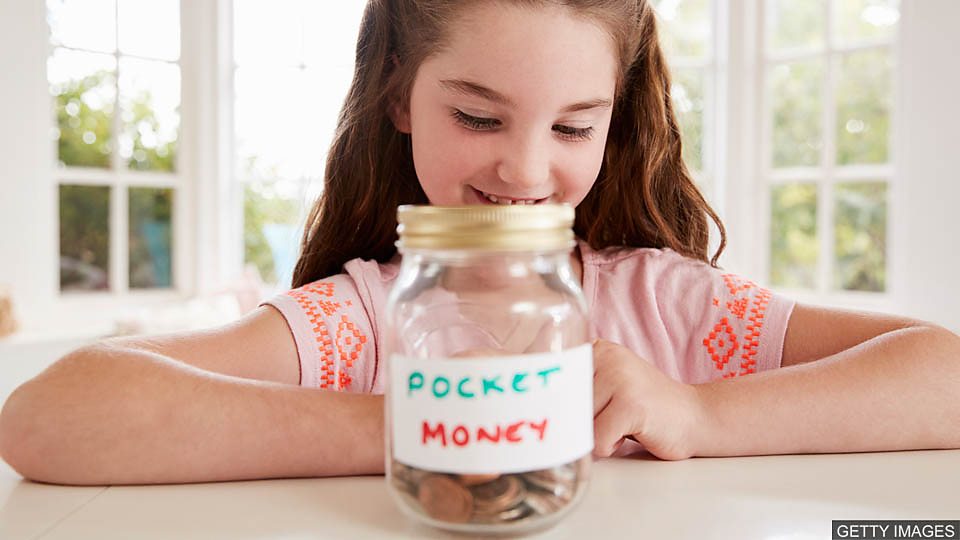
未來的零花錢
隨身英語
The future of pocket money 未來的零花錢

零花錢的未來是什么?隨著父母的理財習慣和方式的改變,孩子們獲取零花錢的方式也在發生變化。雖然目前仍是 “現金為王”,但科技將如何影響未來的支付方式?在未來,家長將如何給孩子發零花錢?年輕人需要了解傳統財務交易的意義嗎?請聽 “隨身英語”。
Vocabulary: finance 詞匯:資金,財政
There are many things we remember from our childhood – the games we played, the music we listened to; but what about earning pocket money? This was our first ever wage for completing tasks such as tidying our bedroom or sorting the laundry. Our reward was a handful of coins that we safely stashed away. But now, it seems, parents’ attitude to handing out cash is changing.
There was a time when cash was king – it was the main currency for financial transactions. These days, though, using credit or debit cards, or making contactless payments, are the most convenient ways of paying. So where does that leave handing over pocket money? Research has found that 84% of British parents currently give notes and coins to their children - typically an allowance, including some discretionary spending, of £7 a week.
But banks predict that by 2028 only one in ten transactions will be with cash, and that it's something today’s children will have to deal with. One particular issue is that children may not understand the value of cash because they never see it. Parents face a dilemma too – finding a new way to transfer pocket money, or maybe not bothering to pay it at all.
Giving children lessons about finance at school is important, and the UK’s Money and Pensions Service advises parents to get children started with money as young as possible. Sarah Porretta from the service told the BBC that for parents who no longer carry cash “The trick is to go and get some coins, just so your children have the opportunity to interact with them. Talk about what you are doing with money. If you are paying with a card or with a phone talk to children about that and link it back to those coins they have handled."
But, of course, many of the goods that young people want to buy – such as add-ons for a computer game – only allow digital transactions. This has led to a number of apps being set up that allow children to track and spend their hard-earned pocket money and parents to transfer money electronically and monitor their child’s spending. Banks also suggest setting up accounts for older children which gives them a cash card to use. But whatever method a parent chooses to adopt, they need to teach their kids that money doesn’t grow on trees!
詞匯表
earn 賺取,掙得
wage 工錢,工資
reward 獎賞
stash away 存起來
cash 現金
cash was king “現金為王”
currency 貨幣
financial transaction 財務交易,金融業務
contactless payment 非接觸支付
hand over 交給……,支付
note 紙幣
coin 硬幣
allowance 零用錢
discretionary spending 任個人支配的開支
value 意義
transfer 把(錢)轉到另一個賬戶
digital transaction 數字交易
hard-earned 來之不易的,辛苦掙得的
account 賬戶
money doesn’t grow on trees “錢可不是從樹上長出來的”,錢來之不易
測驗與練習
1. 閱讀課文并回答問題。
1. According to research, what do 84% of British parents currently do?
2. Name one method of payment which isn't cash that is mentioned in the article.
3. True or false? According to the Money and Pensions service, children should still experience seeing cash.
4. According to the article, what won’t you find on trees?
5. Which word used in the article means ‘regularly watch and check something to see what’s happening’?
2. 請在不參考課文的情況下完成下列練習。選擇一個意思合適的單詞填入句子的空格處。
1. For our business trip to South Africa, we’ll need some local _______ in case we can’t use our credit card.
accounts wages currency value
2. I’m going to spend my _______ cash on a new car – I deserve it!
hard-earned hard-earnings hard-earn hardly-earned
3. Now I’ve got my qualification, I’m earning a good _______ and can start saving for a house.
reward allowance currency wage
4. When we checked into the hotel we had to _______ our passports.
handled handing over handed over hand over
5. My daughter wants a new pair of designer trainers but I told her that _______.
money grows on trees money doesn’t grow on trees
money didn’t grow on trees money doesn’t grow on tree
答案
1. 閱讀課文并回答問題。
1. According to research, what do 84% of British parents currently do?
Research has found that 84% of British parents currently give notes and coins to their children, typically an allowance, of £7 a week.
2. Name one method of payment which isn't cash that is mentioned in the article.
Debit cards, credit cards, contactless payments or digital transactions.
3. True or false? According to the Money and Pensions service, children should still experience seeing cash.
True. Sarah Porretta from the Money and Pensions Service, said: “The trick is to go and get some coins, just so your children have the opportunity to interact with them.”
4. According to the article, what won’t you find on trees?
Money. The idiom is ‘money doesn’t grow on trees’!
5. Which word used in the article means ‘regularly watch and check something to see what’s happening’?
Monitor. Apps allow parents to transfer money electronically and monitor their child’s spending.
2. 請在不參考課文的情況下完成下列練習。選擇一個意思合適的單詞填入句子的空格處。
1. For our business trip to South Africa, we’ll need some local currency in case we can’t use our credit card.
2. I’m going to spend my hard-earned cash on a new car – I deserve it!
3. Now I’ve got my qualification, I’m earning a good wage and can start saving for a house.
4. When we checked into the hotel we had to hand over our passports.
5. My daughter wants a new pair of designer trainers but I told her that money doesn’t grow on trees.

資料下載
-

七年級上、下冊英語詞匯
 3342次下載
點擊下載
3342次下載
點擊下載
-

八年級上、下冊英語詞匯
 2621次下載 點擊下載
2621次下載 點擊下載
-

九年級全冊英語單詞表
 4734次下載 點擊下載
4734次下載 點擊下載
-

中考英語1600個詞匯手冊
 1854次下載 點擊下載
1854次下載 點擊下載
-

高考英語詞匯必備3500
 1391次下載 點擊下載
1391次下載 點擊下載
-

新概念英語1-4冊全套教材
 1391次下載 點擊下載
1391次下載 點擊下載
 300次下載
300次下載

微信掃碼關注"新東方網"服務號
回復""立刻獲取!






